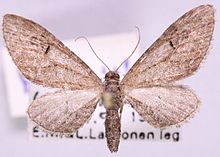| Eupithecia innotata | |
|---|---|

| |

| |
| Scientific classification | |
| Domain: | Eukaryota |
| Kingdom: | Animalia |
| Phylum: | Arthropoda |
| Class: | Insecta |
| Order: | Lepidoptera |
| Family: | Geometridae |
| Genus: | Eupithecia |
| Species: | E. innotata |
| Binomial name | |
| Eupithecia innotata (Hufnagel, 1767) | |
| Synonyms | |
| |
Eupithecia innotata, the angle-barred pug, is a moth of the family Geometridae. The species was first described by Johann Siegfried Hufnagel in 1767. It ranges from Spain in the west to western Siberia and Central Asia in the east.
There are three forms found in the British Isles:
- E. innotata sensu stricto (angle-barred pug) is found only on the east and south-east coasts
- f. fraxinata (ash pug) is widely distributed
- rare f. tamarisciata (tamarisk pug)
The forewings are generally dark brown or grey with few distinguishing marks apart from a small white tornal spot which may not be present on the frequent melanic forms. They are crossed by darker oblique lines, which are angled on the front margin; the submarginal line is white and irregular, especially at each end.The wingspan is 18–24 mm.
Two broods are produced each year with the adults flying in May and June and again in August. Moths of the spring brood are usually darker in colour than the later specimens.

The larva is bright yellow-brown with brown and greenish markings, most strikingly a variety of large, brown-green spots along the back. It has numerous, small white warts all over the body.
The caterpillars of the three races have different food plants:
- f. fraxinata feeding on ash
- E. innotata sensu stricto feeding on sea-buckthorn
- f. tamarisciata is found on the alien food plant tamarisk
The species overwinters as a pupa.
References
- ^ Yu, Dicky Sick Ki. "Eupithecia innotata (Hufnagel 1767)". Home of Ichneumonoidea. Taxapad. Archived from the original on March 24, 2016.
- Mironov, V.G. & Ratzel, U. (2012). "Eupithecia Curtis, 1825 of Afghanistan (Geometridae: Larentiinae)" (PDF). Nota Lepidopterologica. 35 (2): 197–231. Archived from the original (PDF) on 2014-08-11.
- Vladimir Mironov: The Geometrid Moths of the World. In: Axel Hausmann (Hrsg.): The Geometrid Moths of Europe. 1. Auflage. Volume 4: Larentiinae II. Perizomini and Eupitheciini. Apollo Books, Stenstrup 2003, ISBN 87-88757-40-4
- Riley, A.M. and Prior, G. British and Irish Pug Moths A Guide to their Identification and BiologyApollo BooksISBN: 780946589517
- Wikisource:The Moths of the British Isles Second Series/Chapter 9#230
- Chinery, Michael (1986, reprinted 1991). Collins Guide to the Insects of Britain and Western Europe.
- Skinner, Bernard (1984). The Colour Identification Guide to Moths of the British Isles.
- Waring, Paul; Townsend, Martin & Lewington, Richard (2003) Field Guide to the Moths of Great Britain and Ireland. British Wildlife Publishing, Hook, UK. ISBN 0-9531399-1-3.
External links
- Kimber, Ian. "70.169 BF1848 Angle-barred Pug Eupithecia innotata (Hufnagel, 1767)". UKMoths. Retrieved 30 June 2019.
- Lepiforum e.V.
| Taxon identifiers | |
|---|---|
| Eupithecia innotata |
|
This Eupithecia moth related article is a stub. You can help Misplaced Pages by expanding it. |